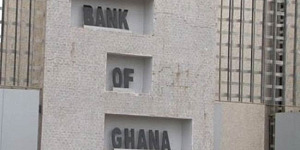Parliament on Wednesday approved a $1 billion sovereign bond from the European market to finance the 2016 budget and to offset some of the country's loans.
A total of $750 million of the facility is to be used to finance the budget while the remaining is to be expended to offset some of the country's loans.
Terms of the facility
The facility has a face value of up to $1,000,000,000; a coupon to be determined by the market at issue date and a maturity of 10 years, among other things.
The Minority, which had, on Tuesday, kicked against the agreement and voted against it, abstained from voting on Wednesday.
This was because the members of the Majority were present in their numbers and even if the Minority had voted against the deal, it would still have been approved since members of the Majority make up more than half of the members of Parliament and, therefore, could approve the deal without the support of the Minority.
The gravamen of the argument of the Minority was that the government was borrowing too much and had nothing to show for it and that the terms of the agreement were not favourable to the people of Ghana.
Tuesdays vote
Although the House rejected the loan agreement by a vote of 67- 66 on Tuesday, according to Article 104 (1) of the 1992 Constitution, no decision can and should be taken if at least half of the members of the House are not present in the chamber.
The provision reads:" Except as otherwise provided in this constitution, matters in Parliament shall be determined by the votes of the majority of members present and voting with at least half of all members of Parliament present,"
At the time the decision was taken, only 133 members were in the House which was five members short of the at least 138 members needed to take a decision.
As a result, the decision was declared null and void and of no effect by the First Deputy Speaker, Mr Ebo Barton-Odro, who presided over proceedings at the time.
But his decision was challenged by the Minority who adopted an "all vote be vote " posture. The decision was later affirmed by the Speaker, Mr Edward Doe Adjaho, who had been absent from the House
That was the first time in the history of the Fourth Republic that a decision taken by Parliament had been rendered null and void as a result of the fact that it was not taken in conformity with the law.
As a result of the lack of the required numbers especially on the Majority side on Tuesday, members of the Majority were in the House in their numbers today just to approve the bond.
Brouhaha over voting on Tuesday
After members of the Minority, notably Mr Kwaku Agyeman - Manu, Dr Mark Asibey - Yeboah and the Minority Leader, Mr Osei Kyei-Mensah-Bonsu, had had their say, the First Deputy Speaker, Mr Ebo Barton-Odro, who presided over proceedings at the time, put the question, asking those in favour of the approval of the bond to say "Aye" and those against to say "No" but after the voice vote was taken twice, it was clear that the votes were even.
Mr Barton-Odro, therefore, asked the Clerk at Table, Mr Ebenezer Djietror, to conduct a head count which was done.
But the First Deputy Speaker, instead of announcing the results of the head count, rather proceeded to state that from the results, it was clear that the number of members in the House were not up to 50 per cent of all members which is the requirement stipulated by the Standing Orders of the House for the consideration of any loan or financial agreement. In his view, therefore, the approval of the loan needed to be deferred.His ruling led to loud cacophonous noises from the Minority who threatened to walk out of the House.
They contended that at the time the count was conducted, their numbers were larger than that of the Majority, and that Mr Barton-Odro, having become aware of that fact, was reluctant to put the results out.
But Mr Kyei-Mensah-Bonsu challenged the Deputy Speaker and said once the count had been conducted, it was incumbent upon Mr Barton-Odro to announce the results.
Mr Bagbin supported the statement made by the Minority Leader and said the First Deputy Speaker was under an obligation to put the results out.
He said he believed that at least half of all members of Parliament (138) were present and, therefore, the constitutional provisions and the rules of the House had been met.
But Mr Barton-Odro came back at him saying the requirement had not been met. He then proceeded to announce that 66 members had voted in favour of the bond while 67 had voted against. This led to wild cheers from the Minority.
Mr Barton-Odro said an addition of the two figures pointed to the fact that only 133 members of the House were present during the vote and reiterated the point that 138 members needed to be present for to make the vote valid.
The Minority Leader accused Mr Barton-Odro of knowing that the members present at the time the vote was conducted were not up to 138 and yet went ahead to remand a head count but Mr Barton-Odro rejected the accusation.
After some back and forth, Mr Bagbin requested that the house suspend sitting for an hour to enable the leadership discuss the matter behind closed doors. After about two and a half hours, they emerged but this time with the Speaker, Mr Edward Doe Adjaho, in the Speaker's chair.
Adjaho affirms Barton-Odro s decision
After being apprised of events by Mr Bagbin and Mr Kyei-Mensah-Bonsu, Mr Adjaho remined members that Parliament was not supreme and was subject to the 1992 Constitution.
He said where the Constitution made a provision for the business of the House, it took precedence over every rule.He quoted Article 104 of the 1992 Constitution and said since at the time the vote was taken the number of members in the House was less than half, the decision was null and void just like Mr Barton-Odro had ruled.
He reminded members that the Supreme Court had ruled in a recent case that nobody could render constitutional a decision which by the laws of the country were deemed unconstitutional.







































